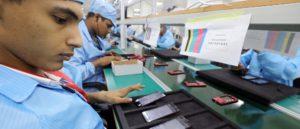People, not technology, shape the future of manufacturing
These are exciting times for manufacturing. A plethora of recent technological developments creates radically new opportunities for how we develop, manufacture, and deliver products globally.
The headlines proclaim that “the robots are coming”, “jobs will be automated”, and “digitalisation is revolutionising production”. Many managers are excited, baffled, or both. Many jobseekers are worried.
Three decades ago, leadership expert Warren Bennis envisioned that “the factory of the future will have only two employees: a man and a dog. The man will be there to feed the dog. The dog will be there to keep the man from touching the equipment.” While this vision is witty, the idea of the fully automated “lights-out” factory still lingers.
But there’s a different vision for the future of manufacturing, where people take centre stage. A vision where people make use of new technology to enable sustainable, socially responsible, and efficient manufacturing.
In this context, putting people first may seem surprising. After all, have we not been told that robotics and digitalisation will complete processes more effectively and efficiently than humans? That machine learning is training machines to train machines? That artificial intelligence is even entering company boardrooms?
While this may hold true for some tasks, the vast amount of other tasks will in fact remain largely unaffected in the near term. To debunk a myth: robots are automating processes, not jobs.
What’s more, we think that these technological developments are good, not bad, for workers. Increased productivity frees up human resources to do tasks where humans are superior to machines.
One example of such a task is the development of new technologies in the first place. Another equally important task is to figure out how to best apply them. People must map production processes, identify the nodes where technology is needed, and reskill the persons in charge of them as required.
While technology helps humans improve productivity, productivity improvement is a task for humans. Consider Tesla. If you ask anyone today to name which automobile brand is the greatest innovator in the car industry, chances are this will be a frequently mentioned brand of choice.
But manufacturing isn’t just about having the most advanced products and technologies. Earlier this year, even Elon Musk admitted that over-automation of its Model 3 production line was “a mistake”, leading him to tweet that “humans are underrated”. The episode sums up our first argument concisely: a factory without humans is a dangerous vision. Manufacturing simply does not move without skilled and motivated people.
In addition, manufacturing is a major employer in most economies. In Switzerland, for example, about one-fifth of the working population bring home salaries from manufacturing jobs.
Manufacturing is essentially a meaningful activity that provides welfare to employees, owners and society. The key is to continue innovating new products and improving manufacturing processes.
According to Paul Krugman, laureate of the Nobel Memorial Prize in Economic Sciences, “A country’s ability to improve its standard of living over time depends almost entirely on its ability to raise its output per worker.”
People, not technology, shape the future of production. How people choose to use new technologies will decide how manufacturing evolves.
For this reason, human learning will remain more important than machine learning in the future of manufacturing. That should be a reassuring thought for producers and employees alike.



